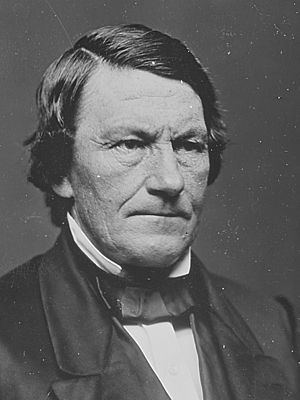John Covode facts for kids
Quick facts for kids
John Covode
|
|
|---|---|
 |
|
| Member of the U.S. House of Representatives from Pennsylvania's 21st district |
|
| In office February 9, 1870 – January 11, 1871 |
|
| Preceded by | Vacant |
| Succeeded by | Henry Donnel Foster |
| Member of the U.S. House of Representatives from Pennsylvania's 21st district |
|
| In office March 4, 1867 – March 3, 1869 |
|
| Preceded by | John Littleton Dawson |
| Succeeded by | Vacant |
| Member of the U.S. House of Representatives from Pennsylvania's 19th district |
|
| In office March 4, 1855 – March 3, 1863 |
|
| Preceded by | Augustus Drum |
| Succeeded by | Glenni William Scofield |
| Personal details | |
| Born | March 17, 1808 West Fairfield, Pennsylvania |
| Died | January 11, 1871 (aged 62) |
| Political party | Whig Republican (after 1854) |
| Signature | |
John Covode (born March 17, 1808 – died January 11, 1871) was an American businessman and politician. He was also an abolitionist, meaning he was against slavery. He served three terms in the United States House of Representatives for Pennsylvania.
Contents
Early Life and Work
John Covode was born in Fairfield Township, Pennsylvania. He grew up working on his father's farm. Later, he learned the trade of a blacksmith.
He then worked at a woolen mill in Lockport, Pennsylvania. He eventually bought the mill and became very successful. He also had other business interests, like the Westmoreland Coal Company. He was the first president of this company in 1854.
Before joining the U.S. Congress, Covode served two terms in the Pennsylvania House of Representatives. This is part of Pennsylvania's state government. He tried twice to join the Pennsylvania Senate but was not successful.
Serving in the U.S. House of Representatives
In 1854, John Covode was elected to the United States Congress. He ran as a candidate for the Opposition Party.
Later, he joined the Republican Party. He was re-elected to Congress in 1856. He strongly supported several important laws and groups. These included the Freedmen's Bureau, which helped formerly enslaved people. He also supported the Civil Rights Act of 1866, which gave rights to all citizens. He backed the Reconstruction Acts, which helped rebuild the Southern states after the Civil War.
In 1866, he attended a big meeting in Philadelphia. This meeting was called the Union National Convention.
Efforts to Impeach President Johnson
On February 21, 1868, Covode took a big step in the House of Representatives. He suggested a plan to impeach President Andrew Johnson. To impeach means to formally accuse a public official of wrongdoing.
A few days later, the House of Representatives voted to impeach President Johnson. However, the Senate did not vote to remove him from office during his trial.
Important Committees
John Covode was a leader on several important committees in Congress. From 1857 to 1859, he led the House Committee on Public Expenditures. This committee looked at how the government spent money.
From 1867 to 1869, he led the House Committee on Public Buildings and Grounds. This committee was in charge of government buildings and land. He also served on a special committee that looked into how the American Civil War was being fought.
The Covode Committee
Covode is most remembered for leading a special committee in 1860. This committee was officially called the United States House Select Committee to Investigate Alleged Corruptions in Government. However, it is better known as the Covode Committee.
This committee investigated whether President James Buchanan had done anything wrong. They looked into possible corruption in the government.
His Final Term in Congress
In 1870, there was a dispute over who won the election for the Forty-first Congress. John Covode and Henry D. Foster both claimed victory. On February 9, 1870, the House of Representatives decided that Covode was the rightful winner.
He then officially took his seat in Congress. He served until his death later that year. John Covode died in Harrisburg, Pennsylvania, when he was 62 years old.
Family Life
John Covode had a son named George H. Covode (1835–1864). George became a colonel in the Union Army during the Civil War. Sadly, he died in battle on June 25, 1864.
See also
- List of United States Congress members who died in office (1790–1899)
 | Roy Wilkins |
 | John Lewis |
 | Linda Carol Brown |

